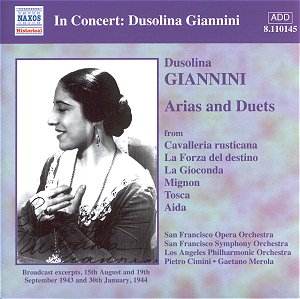Robert
J Farr, in his MusicWeb review of this product, contextualises
Giannini perfectly and I cannot improve on this (http://www.musicweb-international.com/classrev/2003/Aug03/Giannini.htm).
Collectors can count themselves lucky to have this historical
document at their disposal so cheaply: it acts as a valuable (possibly
invaluable) partner to Preiser’s Giannini album (89044) which
concentrates on her recorded legacy (HMV, from 1928 to 1932).
As
a ‘composite’ recital (from three separate broadcasts), the present
Naxos programme works well if one listens straight through. The
two excerpts from Acts 1 and 4 of Verdi’s La forza del destino
(from a broadcast on September 19th, 1943) which kick
things off reveal much of Giannini’s characteristics. With the
very opening lines (‘Son giunta’), she proclaims, delineates and
owns her own territory: her resolution is such that nobody would
argue from that moment on. This is terrifically confident singing,
the ‘steel’ in the voice used to telling effect. ‘Pace, pace mio
dio’ includes much tenderness (and her tuning is excellent, not
always the case in this aria). In fact, all of her Verdi is impressive.
The Aida excerpt (‘Ritorna vincitor!’) displays more of
her steely determination. Although these are just excerpts, it
is remarkably easy to feel as if one is slipping in and out of
a complete traversal of the role, such is her identification with
the heroine.
The
Thomas and Ponchielli excerpts (LAPO/Cimini) represent the highlights
of the disc. Ambroise Thomas wrote very beautiful music, and his
tendresse is evident throughout (special mention to the
sweetly chirping woodwind here). Giannini’s velvet legato is most
affecting, her inflections seeming to drag the listener in. The
Gioconda excerpt is sung with real conviction (the accompaniment,
however, is more workaday). Be warned, however: Giannini could
appear shrill and harsh at full pelt: the climax of this Ponchielli
is uncomfortable (track 4, around three minutes in).
Separating
the dramatic rendition of ‘Ritorna vincitor!’ from Puccini’s ‘Vissi
d’arte’ are two popular ballads, The Rosary and I love
you truly. Dispensable both, to my Xenakis-saturated ears,
but they had their day and should certainly be heard as part of
the period aura. Unfortunately, after the high emotion of ‘Ritorna’,
the sudden, sugary arrival of The Rosary is almost comical.
Paul Campion’s accompanying notes tell us that this piece ‘achieved
immense popularity in the plush drawing-rooms and concert halls
of the Edwardian age’ but today it seems (to this reviewer at
least) difficult to take seriously. I love you truly is
similarly afflicted, and sandwiching these two between Verdi and
Puccini does nobody any favours at all.
Evidently
Giannini is more at home in Vissi d’arte, Tosca’s Act 2
tender hymn to art which really does emerge with real depth on
this occasion.
Fascinating
to have the extended excerpts from Cavalleria rusticana.
The orchestra here sounds completely at home, and there is a real
feel of the grease paint about this account. It seems strange
to close the disc with an orchestral excerpt (the famous ‘Intermezzo’),
but perhaps it was needed to make up the playing time (50 minutes
is short for Naxos).
As
a ‘by the way’, apparently Giannini sang Kundry (Parsifal)
under the baton of Pierre Monteux in the 1940s. Now that would
have been worth hearing!.
This
disc is definitely worth the small outlay. With the exception
of some discomfort at climaxes, sound is perfectly acceptable
given the sources. Do hear the Presier disc, also. There is some
overlap: ‘Son Giunta’, ‘Pace, pace’ (conducted Barbirolli, 1928),
and ‘Ritorna vincitor!’ (Sabajno, 1928) are all there, too, but
plenty of other goodies, including, on the Puccini side of the
balance sheet, a touching ‘Un bel di vedremo’ (Butterfly,
cond. Schmalschtich, 1928) to complement the ‘Vissi d’arte’ (Tosca)
here. It is true they sound more studio-bound than these broadcasts,
but there are plenty of insights to be gleaned from both discs.
Colin
Clarke
see also review by Robert
J Farr


![]() Dusolina Giannini (soprano);
Claramae Turner (contralto, Mascagni); San Francisco Opera Orchestra/Gaetano
Merola; Los Angeles Philharmonic Orchestra/Pietro Cinini (Thomas and Ponchielli).
Dusolina Giannini (soprano);
Claramae Turner (contralto, Mascagni); San Francisco Opera Orchestra/Gaetano
Merola; Los Angeles Philharmonic Orchestra/Pietro Cinini (Thomas and Ponchielli).
![]() NAXOS HISTORICAL 8.110145 [50.24]
NAXOS HISTORICAL 8.110145 [50.24]